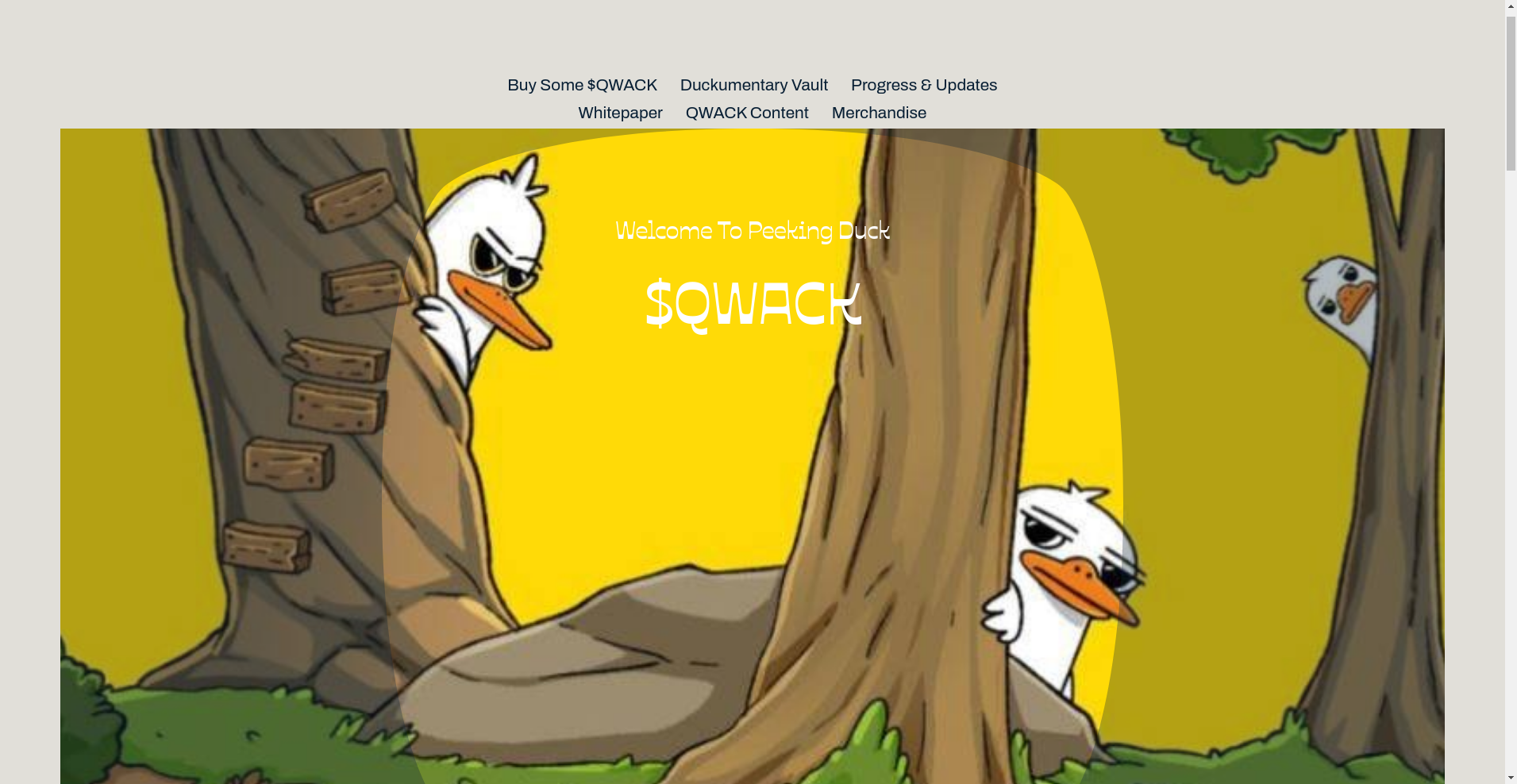Peeking Duck Review: Scam or Legit Crypto? Uncovering All The Red Flags

What Exactly Is Peeking Duck?
Peeking Duck, represented by its token $QWACK, presents itself as a fun and community-driven meme coin built on the Solana blockchain. The project markets itself with playful branding, humor, and a quirky theme centered around the concept of anatidaephobia—the fear of being watched by a duck. Promising to blend laughter with potential utility, its narrative encourages users to join a flock of like-minded meme enthusiasts.
However, behind the playful facade lies the critical question: is Peeking Duck a legitimate project or just another crypto scam? This article aims to scrutinize the project's claims, assess its transparency, security, and overall credibility based on the available evidence—and importantly, to alert potential investors to red flags that could indicate scam tactics.
Who Is The Team Behind Peeking Duck?
The transparency of the team behind Peeking Duck is notably lacking. The project team is not disclosed or doxxed publicly, which is a common red flag in the crypto space. The only available data points to a blockchain address and a smart contract address, with no verifiable identities or credible team members listed.
Looking at their roadmap and vision, the project emphasizes community engagement, meme culture, and staged growth plans, but nothing concrete about the founders' backgrounds or professional experience is provided. This opacity severely hampers trust, especially considering the promises of “fundamentals,” “partnerships,” and “project development” that are typical of credible projects.
- Absence of team details or founders' backgrounds.
In summary, the lack of transparency about leadership or developers raises serious doubts about the project’s legitimacy and suggests potential risks for investors, especially in cases where anonymous teams operate without verifiable credentials.
Peeking Duck Security Audit: A Deep Dive into the Code
The sole available audit data, conducted via Cyberscope, indicates that Peeking Duck has undergone a basic security check. The audit confirms the existence of a smart contract on Solana with an audit record, but no detailed vulnerabilities or critical issues are disclosed publicly.
Key points from the Cyberscope data include:
- Audit conducted on a contract address associated with the project.
- High community score of 35, which is relatively low and indicative of community concern or distrust.
- Fundamentals and security scores are moderate (~56-94%), but these don’t necessarily guarantee safety, especially given the limited transparency and absence of thorough third-party audits.
- No evidence of KYC, comprehensive audit reports, or security enhancements beyond a basic check.
Given the limited audit information, potential investors should be cautious. The absence of detailed code reviews, bug bounty programs, or third-party security evaluations increases the risk of vulnerabilities or malicious code—especially critical in DeFi projects where funds are at stake.
Peeking Duck Tokenomics: A Fair System or a Trap?
The tokenomics of Peeking Duck ($QWACK) shows a total supply of nearly one billion tokens, with a visible distribution plan. The largest portion (25%) is allocated to liquidity pools, with other allocations for marketing, the team, and charitable causes. The project describes a simple utility and community focus, typical of meme coins.
- Total Supply: 999,994,020 $QWACK—an inflated supply common in meme tokens, which can lead to rapid inflation and price dumps.
- Distribution: Emphasis on liquidity (25%) and marketing (20%), but with little transparency on team allocation or potential for large wallet dumps.
- Utility & Roadmap: Includes NFTs, staking, game development, and merchandise, but these are common placeholders and not necessarily implemented or verified yet.
This tokenomic setup is susceptible to pump-and-dump schemes, especially given the lack of lock-up mechanisms or vesting schedules for team tokens. The significant supply and aggressive marketing suggest a risk of a high inflationary environment, which can lead to rapid value erosion once initial hype fades.
Beyond the Hype: Is Peeking Duck Actually Being Built?
Based on the available summaries and developer activity, Peeking Duck appears to be largely in an early or conceptual stage. The project website showcases active promotion, meme content, and a roadmap with planned milestones like NFT launches and game development.
However, there’s little tangible progress or verifiable development activity beyond marketing hype. The project’s social media channels are active with meme content, but concrete development updates, code repositories, or third-party audits are absent or limited. This pattern is common among meme projects that focus on community hype rather than production.
This raises concerns about the project’s long-term viability and whether it will deliver on its promise of utility, or if it’s primarily designed to attract quick speculative investments with little substance.
The Fine Print
Peeking Duck’s legal and operational details are notably vague. The project claims to have registered trademarks and registered domain names, but no formal legal disclosures or terms of service are publicly available. Its reliance on community engagement and meme culture often masks the lack of comprehensive legal frameworks or investor protections.
- Absence of clear legal disclaimers or user rights.
- Vague descriptions regarding token rights, ownership, and liability.
- The project heavily promotes community-driven decision-making but does not outline dispute resolution or compliance mechanisms.
Investors should be cautious, as missing or ambiguous legal terms can be exploited, and community-driven governance without proper framework could lead to manipulations or collapses.
Final Verdict: Should You Risk Investing in Peeking Duck?
After examining the available evidence, Peeking Duck ($QWACK) raises several red flags typical of meme coins and speculative tokens. The lack of team transparency, limited security audit details, high token supply, and reliance on hype over substance make it a risky proposition.
While the project is actively promoting community engagement and planning development milestones, these are largely unverified and typical of many meme projects that fail to deliver. The possibility of a pump-and-dump or rug pull remains high, especially given the absence of credible audits and transparent operations.
In conclusion, investors should approach Peeking Duck with caution. Conduct thorough due diligence, and never invest more than you are willing to lose in projects with such limited transparency and verifiable progress.
- Positive Points
- Active community engagement through memes and social media.
- Planned roadmap including NFTs and games.
- Moderate security scores based on available audit data.
- Major Red Flags
- Lack of team disclosure or verifiable founders.
- Limited or superficial security auditing—no detailed third-party review.
- High token supply with risk of inflation and dump potential.
- Vague legal terms and reliance on community governance.
Ultimately, this Peeking Duck review underscores the importance of comprehensive crypto due diligence before jumping into seemingly playful yet opaque projects. Proceed cautiously and invest responsibly.

Amanda Harris
Technical Security Educator
Security professional passionate about the "human firewall." I translate complex crypto threats into simple, actionable security habits for everyday users.
Similar Projects
-
Iluminary
Comprehensive Review of Iluminary Crypto Project | Crypto Scam Checker & Project Review
-
CristianoRonaldoSpeedSmurf7Siu
CristianoRonaldoSpeedSmurf7Siu ($SUI) Review: Risks & Insights
-
Venus Protocol
Review of Venus Protocol: Is it a Legit Crypto Project or a Scam? Crypto Scam Checker & Review
-
BAYC
Review of BAYC Crypto Project - Scam or Legit? Crypto Scam Checker & Project Review
-
BEEVO
Crypto Scam Checker Review: Is BEEVO a Legitimate Project or Scam?